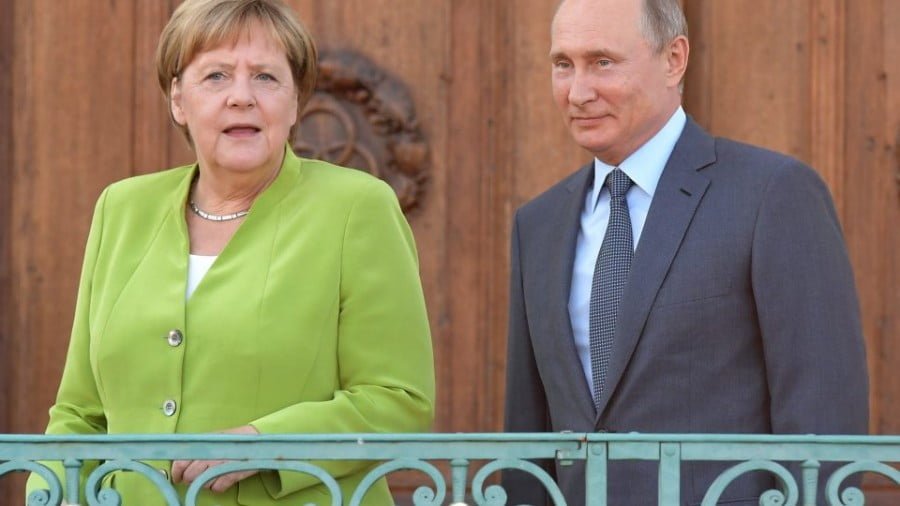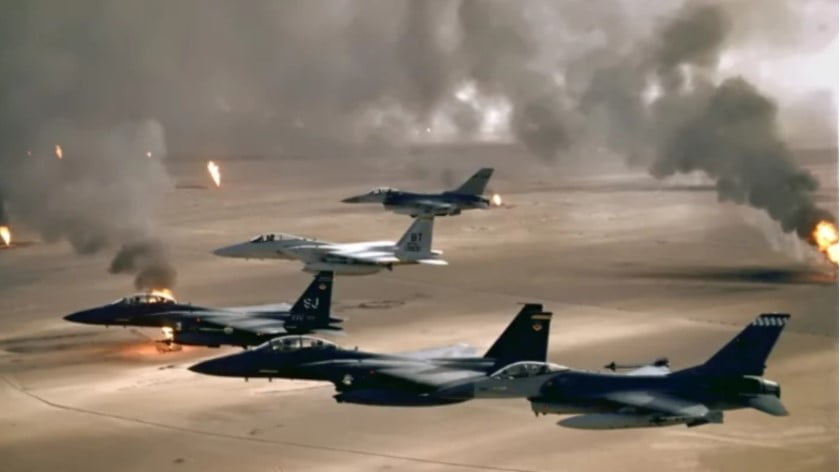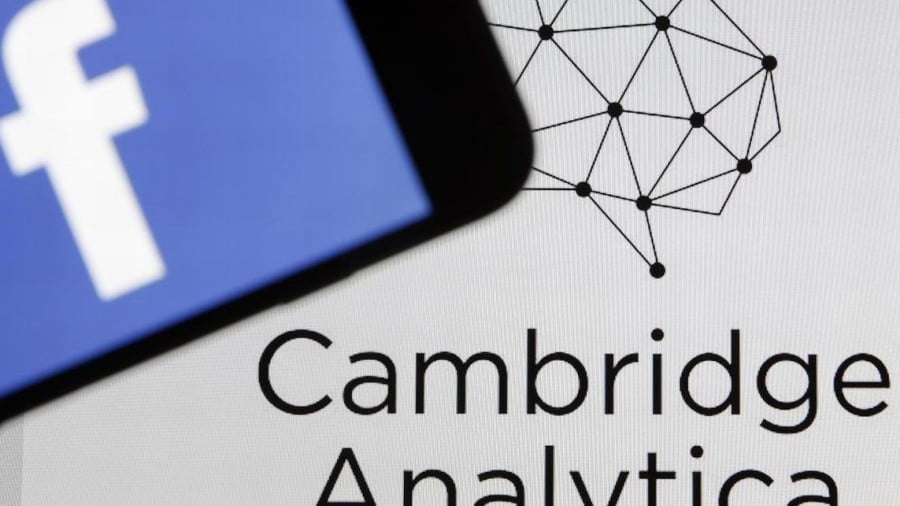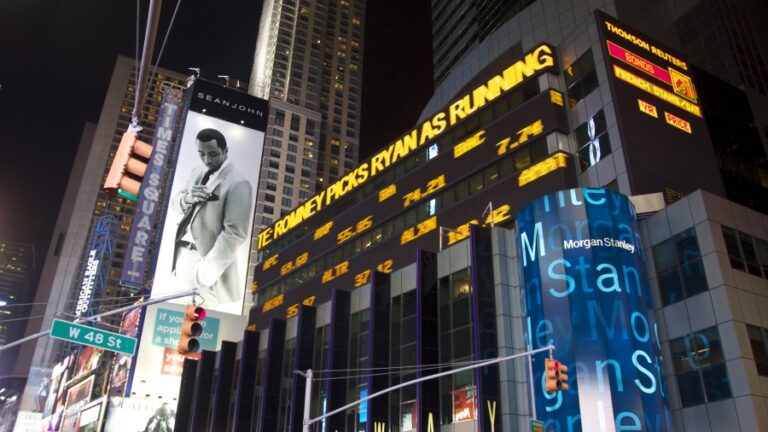From Baltic Sea to Black Sea, Russia Aims for a Win-Win
When Russian President Vladimir Putin, fresh from his star turn at the wedding of Austrian Prime Minister Karin Kneissl, showed up at the 18th century Meseberg Palace north of Berlin on Saturday afternoon for a face-to-face with German chancellor Angela Merkel, that was a surprise of sorts; the meeting had been announced only a few days earlier.
They talked for three hours over a multi-course menu; the Iran nuclear deal; the endless stalemate in Ukraine; the humanitarian angle in Syria; the Nord Stream 2 pipeline.
Angela Merkel is not part of The Sanctioned supergroup – thus not in the same league as multi-instrumentalists Putin, Xi, Rouhani and Erdogan. She’s been only tariffed by solo act Trump, not sanctioned. She’s no Suzi Quatro, not to mention Joan Jett, although she might entertain rompin’ across I hate myself /for loving you when facing Putin. She’s more like a staid back-up singer from Estonia at the Eurovision song contest.
So no wonder that when the real surprise surfaced at Meseberg, it bore a vague resemblance to a remixed Eurovision song contest.
As confirmed to Asia Times by diplomatic sources, a top summit featuring Germany, Russia, France and Turkey is on the way. Call it an expanded Eurovision – with Turkey included due to (wobbling) NATO membership.
Ostensibly, the summit would be on Syria – according to the Kremlin. That does not cut it – as Syria is already being discussed in detail in Astana by Russia, Iran and Turkey.
Yet as The Sanctioned and The Tariffed share the stage, what they do embody is defiance of solo act Trump. The idea for the one-off top billing came from the Robert Plant-esque Sanctioned member Erdogan, even with a date attached – September 7. An ever cautious Merkel only went as far as admitting the summit “could make sense – this must be well-prepared, so there is no date yet.”
The fact is multinational sherpas are already working on it. In parallel, the finance ministers of Turkey and France not only agreed to confront sanctions on Turkey, but to come up with further bilateral economic cooperation. Sun King Macron is dying for his star turn at The Tariffed to go platinum.
I stream, you stream, we all do Nord Stream
From Russia’s perspective, the very complex game goes way beyond a revamped Eurovision contest; it’s all about the geopolitical battle in the intermarium – between the Baltic and the Black Sea.
Putin was keen to stress the €9.5 billion (US$10.8 billion) Nord Stream 2 is a “purely economic project”, which does not necessarily imply transit of gas through Ukraine will stop: “I am aware of the Federal Chancellor’s position. All that matters to us is that this transit is economically feasible … and makes economic sense.”
Gazprom – a partner in Nord Stream 2 with other Western European energy giants – had concluded already by 2015 that a Ukraine transit makes no economic sense whatsoever. Merkel though – after investing so much in the Maidan scenario – remains an immovable object; even after Nord Stream 2 is online, she insists Ukraine “should play its part in gas transit to Europe.”
Putin is always forced to exhibit Lao Tzu levels of patience when re-explaining the Ukraine charade: “In the context of the settlement of the Ukrainian crisis, which, unfortunately, does not make headway at all, we are inclined to stress the lack of alternative to implementation of the Minsk agreements, to note our interest in working within the Normandy format and the contact group, our readiness to continue cooperating with the UN special monitoring mission.”
Kiev sabotages the Minsk agreements non-stop – and that’s why there’s “no stable ceasefire,” as even Merkel admits.
So Putin had to revert to the obvious: Nord Stream 2 “will make it possible to improve the European gas transportation system, diversify supply routes and minimize transit risks, and, most importantly, to meet Europe’s growing demand for energy.”
Nord Stream 2 – from Russia along the Baltic Sea bed all the way to German shores – should be ready by the end of 2019. The new gas pipeline doubles the capacity of the original Nord Stream and follows the same route. According to a recent poll, Nord Stream 2 was approved by 66% of Germans. So the Trump solo act dream of having Europeans buying “vast amounts” of made in USA liquefied natural gas (LNG) now looks as much a mirage as a Pink Floyd reunion.
I see a sea and I want it painted black
The Nord Stream 2 angle proved that Putin and Merkel broadly agree on Baltic geoeconomics. They also agree on preserving the JCPOA, also known as the Iran nuclear deal. And yet Merkel adds a conditionality that comes straight from the Beltway: Germany is “following Iran’s activities with concern, be it the missile program or the situation in Syria.” You can take the girl out of exceptional tariffs, but you can’t take exceptionalism out of the girl.
The preferred Syria angle when The Sanctioned meet The Tariffed is now humanitarian – certainly less contentious than delving on who’s actually winning the war, why and how.
Putin stressed there are millions of Syrian refugees in Jordan, Lebanon and Turkey, “potentially a huge burden” for Europe: “That’s why we have to do everything to get these people back home” and restore “basic services” such as healthcare or water supplies. And “I think that everyone is interested in this, including Europe.” Merkel agrees.
And then there’s Sanctioned superstar Erdogan and his unpredictable outbursts: The hammer of the gods / We’ll drive our ships to new lands / To fight the horde, and sing and cry / Valhalla, I am coming!
What’s certain for now is that an IMF bailout of Turkey simply won’t happen; Erdogan can’t possibly sell it to his local audience. Options on the horizon come down to Qatar – $15 billion in investments already committed – and China ready to deepen Turkey’s connectivity to the New Silk Roads/Belt and Road Initiative (BRI).
During the Obama administration, Cold War 2.0 was launched on Russia by transposing the old Iron Curtain across the intermarium, from the Baltic to the Black Sea. A post-Maidan anti-Russian Ukraine – which borders the Black Sea – is a central part of the strategy.
Yet now Turkey provides Moscow with the perfect opening to smash the geopolitical chessboard and destroy the concerted offensive – which includes key elements from relentless NATO expansion to sanctions as no holds barred economic war.
What goes on in Turkey way extrapolates a bunch of European banks exposed to Ankara’s debt and possible domino contagion of emerging markets. The heart of the action concerns the Black Sea.
The primary role of an anti-Russian Kiev is to break the expansion of the Eurasia Economic Union (EAEU). The primary role of Turkey in NATO is to break Eurasia integration as a whole – especially the complex intersection between BRI, EAEU and the SCO.
The “moderate rebel” disaster in Syria frustrated the Beltway plan of blocking Russia out of the Eastern Mediterranean. Crimea reverting back to Russia frustrated the Beltway strategy of controlling the Black Sea. Even Eurosivion back-up singer Merkel is starting to get a glimpse of the complexities inbuilt in the Syria-Ukraine unified front.
The whole mystique of The Sanctioned will develop on how, and if, they will be able to star in their own right by performing as a supergroup. The ultimate chess move of the Russian multi-instrumentalist may be to make Turkey at least indifferent to NATO – and run the Black Sea as a Russo-Turk condo. Can you hear that Paint it Black groove echoing around the Kremlin?







